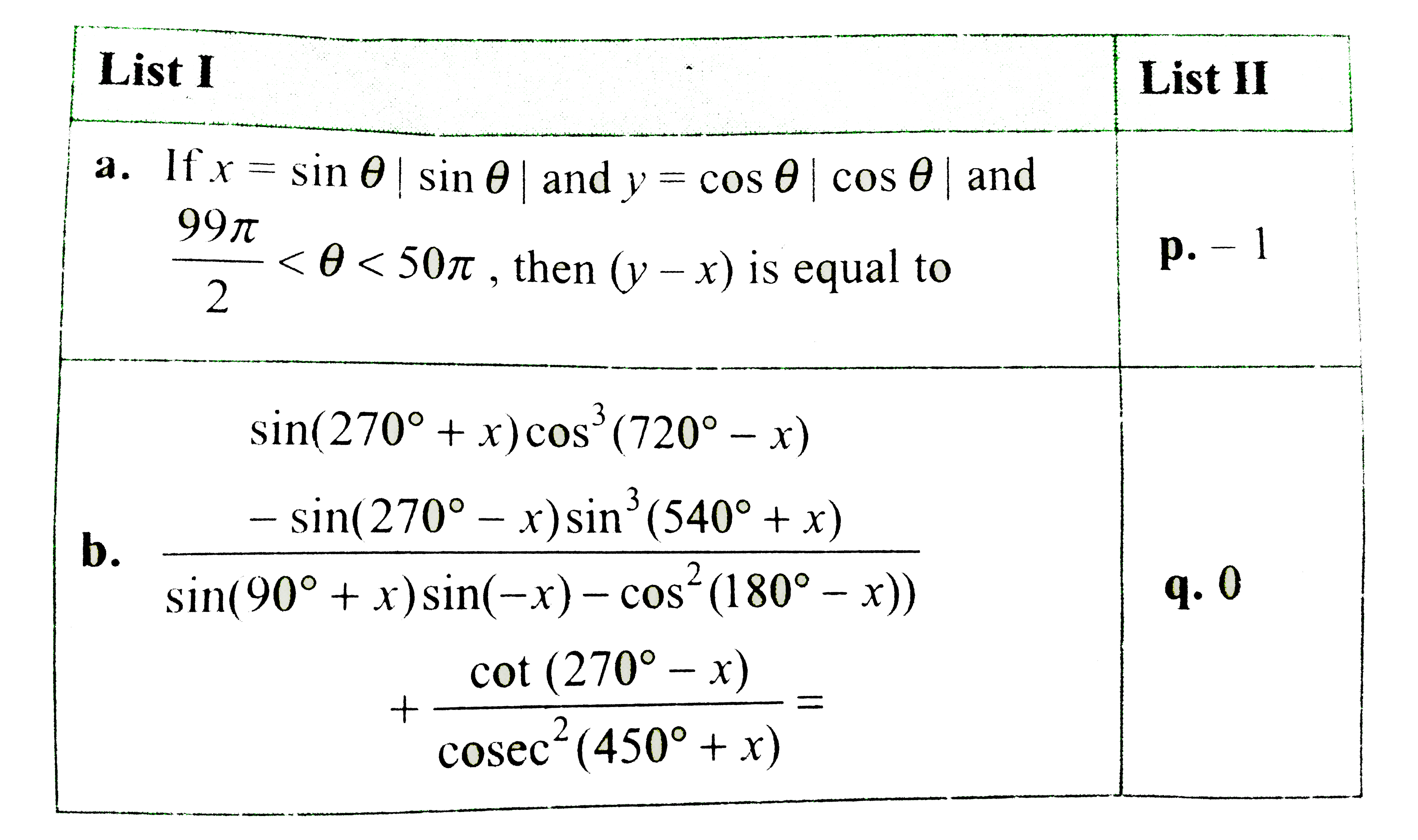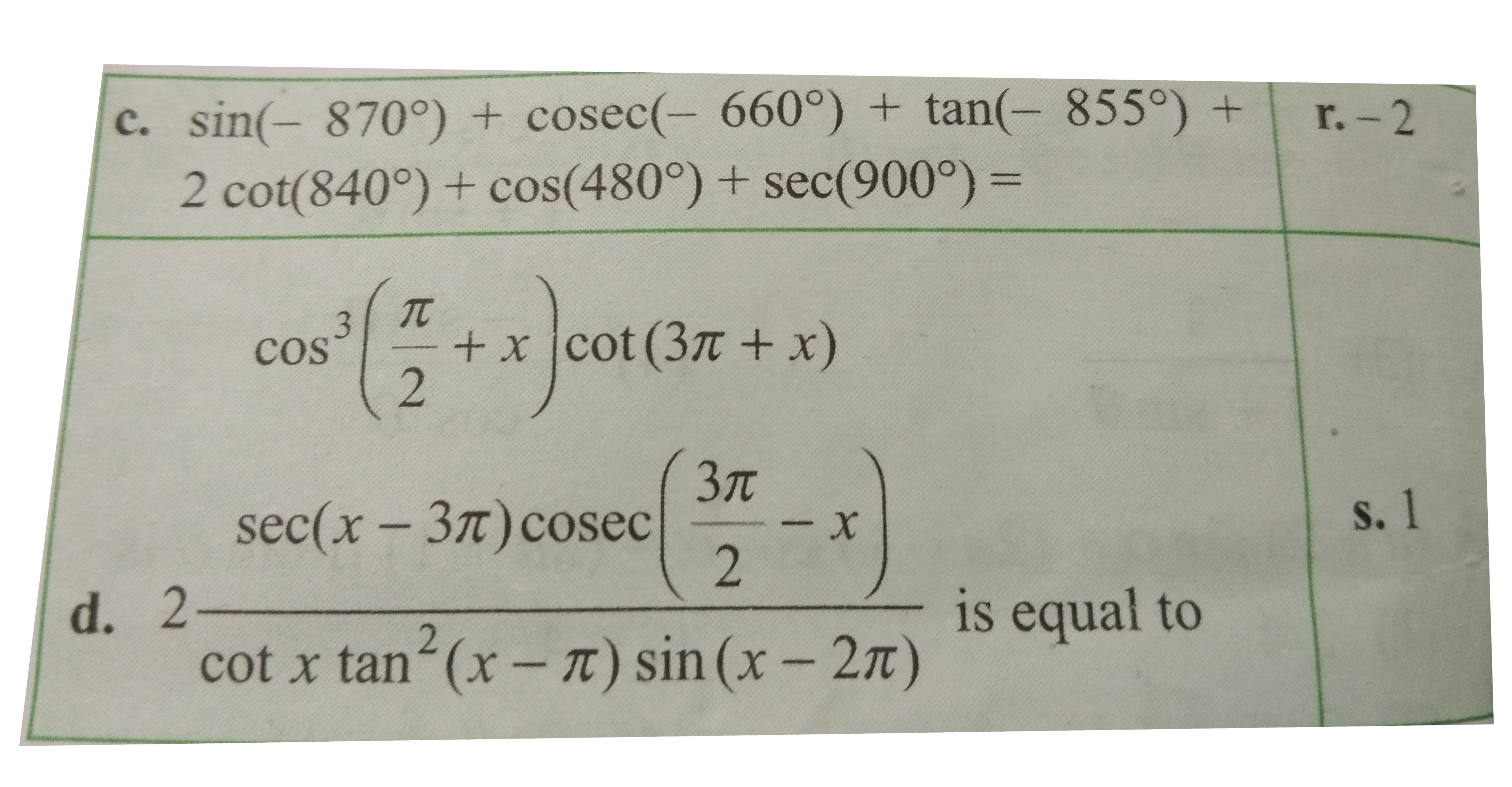α,β,γandδ are angle in I, II, III and IV quadrants, respectively and none of them is an integral multiple of π2. They form an increasing arithmetic progression. Which of the following holds? cos(α+δ)>0 cos(α+δ)=0 cos(α+δ)<0 cos(α+δ)>0orcos(α+δ)<0 Which of the following does not hold? sin(β+γ)=sin(α+δ) sin(β−γ)=sin(α−δ) sin(α−β)=tan(β−δ) sin(α+γ)=cos2β) If α+β+γ+δ=θandα=700, then 4000<θ<5800 4700<θ<6500 6800<θ8600 (d) 5400<θ<9000Solution in Bengali
cos(α−δ)>0
cos(α−δ)=0
cos(α−δ)<0
cos(α−δ)>0orcos(α−δ)<0
The correct Answer is:A
0<α<90∘,90∘<β<180∘
180∘<γ<270∘,270∘<δ<360∘
⇒γ<270∘<α+δ<450∘
⇒α+δ lies in the I or IV quadrant and cosine in both is positive.
Topper's Solved these Questions
- TRIGONOMETRIC FUNCTIONS BOOK - CENGAGE PUBLICATIONCHAPTER - TRIGONOMETRIC FUNCTIONS EXERCISE - Matrix Match Type
3 Videos
- TRIGONOMETRIC FUNCTIONS BOOK - CENGAGE PUBLICATIONCHAPTER - TRIGONOMETRIC FUNCTIONS EXERCISE - Numerical Value Type
11 Videos
- TRIGONOMETRIC FUNCTIONS BOOK - CENGAGE PUBLICATIONCHAPTER - TRIGONOMETRIC FUNCTIONS EXERCISE - Multiple Correct Answers Type
17 Videos
- TRIGONOMETRIC EQUATIONSBOOK - CENGAGE PUBLICATIONCHAPTER - TRIGONOMETRIC EQUATIONSEXERCISE - Archives (Numerical value type)
4 Videos
- TRIGONOMETRIC RATIOS AND TRANSFORMATION FORMULASBOOK - CENGAGE PUBLICATIONCHAPTER - TRIGONOMETRIC RATIOS AND TRANSFORMATION FORMULASEXERCISE - Archives (Numerical Value Type)
2 Videos
Similar Questions


View SolutionThe value of the expression tan2200−sin2200tan2200+sin2200 is__________
View SolutionIf 0≤θ≤πand81sin2θ+81cos2θ=30 is
View SolutionThe number of all possible values of θ, where 0<θ<π, for which the system of equations (y+z)cos3θ=(xyz)sin3θ,xsin3θ=2cos3θy+2sin3θzand(xyz)sin3θ=(y+2z)cos3θ+ysin3θ have a solution (x0,y0,z0) wiith y0z0≠0 is
View SolutionThe maximum value of the expression 1sin2θ+3sinθcosθ+5cos2θ is………
View Solutionsin alpha, cos alpha, cos (alpha + delta) sin beta, cos beta, cos (beta + delta) sin gamma, cos gamma, cos (gamma + delta)] | = 0
View SolutionProve that det [[sin alpha, cos alpha, sin (alpha + delta) sin beta, cos beta, sin (beta + delta) sin gamma, cos gamma, sin (gamma + delta)]] = 0
View SolutionIf origin is the orthocenter of a triangle formed by the points (cos alpha*sin alpha,0)*(cos beta,sin beta.0),(cos gamma,sin gamma,0) then sum cos(2 alpha-beta-gamma)=
View SolutionIf A=(cosα,sinα,0),B=(cosβ,sinβ,0),C=(cosγ,sinγ,0) are vertices of ΔABC and cosα+cosβ+cosγ=3a,sinα+sinβ+sinγ=3b then orthocentre is
View Solution{:|( sin alpha , cos alpha ,cos (alpha +delta) ),( sinbeta, cos beta,cos (beta+delta )),(sin gamma , cos gamma , cos ( gamma +delta ))|:}=0
View SolutionIf Δ=∣∣ ∣ ∣∣sinαcosαsinα+cosβsinβcosαsinβ+cosβsinγcosαsinγ+cosβ∣∣ ∣ ∣∣ then Δ equals
View SolutionIf α,β,γ are the angles of a triangle and system of equations cos(α−β)x+cos(β−γ)y+cos(γ−α)z=0 cos(α+β)x+cos(β+γ)y+cos(γ+α)z=0 sin(α+β)x+sin(β+γ)y+sin(γ+α)z=0 has non-trivial solutions, then triangle is necessarily a. equilateral b. isosceles c. right angled d. acute angled
View SolutionUsing properties of determinants. Prove that|sinαcosαcos(α+δ)sinβcosβcos(β+δ)sinγcosγcos(γ+δ)|=0
View SolutionIf origin is the orthocentre of a triangle formed bythe points (cosα,sinα,0),(cosβ,sinβ,0),(cosγ,sinγ,0) then ∑cos(2α−β−γ)= -
View SolutionIf (Cosα,Sinα,0),(cosβ,sinβ,0),(cosγ,sinγ,0) are vertices of a triangle then circum radius R is
View SolutionIf sinαsinβ=cosγcosδ, then sin(α−β2).cos(α+β2).cosδsin(δ−γ2).sin(δ+γ2).sinβ
View Solution
